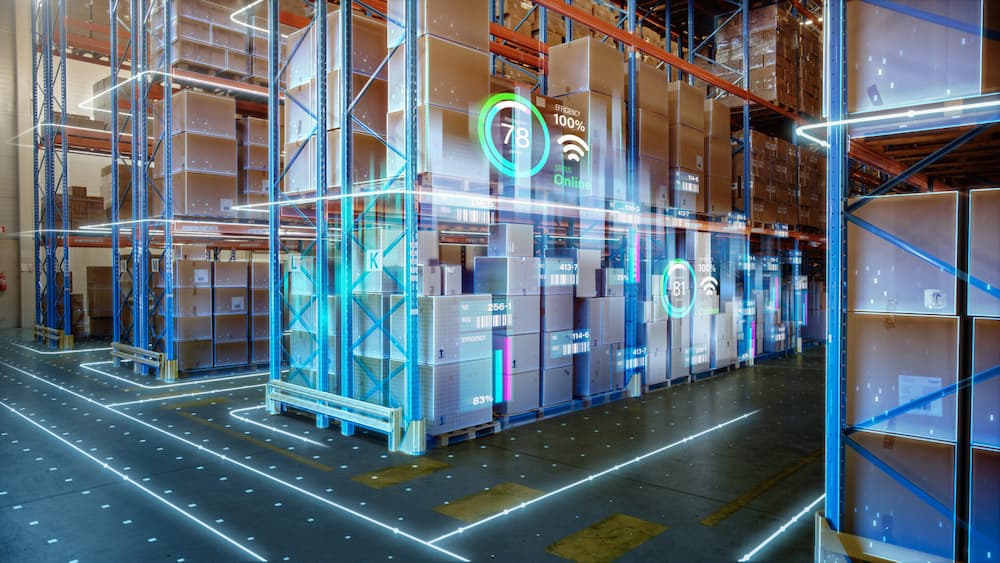Have you ever wondered how UK manufacturers can offer fast delivery times on products and services for their clients? One of the main reasons is thanks to the rise of automation. Automation supports supply chains in many ways and helps us become cheaper, faster, and generally more efficient.
In such a fast-moving world, where consumers have an immense choice, machine and product designers must work under tight deadlines to produce their eventual applications for sale without losing quality. As a result, automation is heavily relied upon to sustain the high productivity required.

How Do You Automate a Supply Chain?
Automation exists in manufacturing in a broad range of areas. Many facilities are already implementing automation as part of their growth into smart factories, but it is also a beneficial tool for supporting your supply chains up and downstream.
Automation of a supply chain can occur in several ways. Essentially, wherever you can turn a manual step of the chain into an automated one will help improve both accuracy and speed.
Examples of jobs getting automated in a supply chain include tracking logistics and packaging. Essential items can be automatically tracked when arriving and exiting storage with labels updated to the new requirements. In addition, repeated orders can be placed for predicted businesses to order your required materials and maintain operations without manual input.
Events That Disrupt Supply Chains
Several external and internal factors could disrupt a supply chain. Here are some of the most prominent ones.
Unforeseen International Events
While we do not tend to see many natural disasters in the UK, many manufacturers will source their materials from other countries. Recent events like the pandemic, Russia’s war in Ukraine, and any number of unforeseen events can disrupt the nations where these resources are purchased.
Logistics Failures
As the global population increases and international commerce becomes easier and easier, much more pressure is put on international transport systems, which can cause significant congestion or delays. This has been felt by every industrial spring manufacturer around the world and has inspired more initiatives to build stronger supply chains and protect these vital logistic routes.
Cyberattacks
If a business is not adequately protected online, it leaves itself vulnerable to cyber attacks. If successful, cybercriminals can access businesses’ data and wreak havoc on their supply chain and schedule. These criminal acts are entirely unexpected and may be unrelated to your facility specifically, but their effect will potentially harm a manufacturer’s intended deadlines.

The Benefits of Automation
Regarding automating supply chains, several benefits arise from moving from a more manual process.
Increased Efficiency Reduces Costs
Automation will significantly reduce costs by bringing machine efficiency to the logistics of your supply chain. Procurement, production, transportation, and distribution are just a few processes that have improved speed, accuracy, and efficiency. Inventory levels can be tracked, demand can be predicted, routing can be optimised, and errors can be avoided with automated systems. As a result, costs are reduced, delivery times are reduced, and customers are happier.
In addition, a single person will be tasked to monitor many automated processes, such as tracking the progress of your supply chain items. This allows your team to be upskilled in areas where automation is impossible and make the most of their skills in complex areas such as custom spring design.
Reduce Errors and Increased Accuracy
By automating parts of the supply chain, you reduce the chances of human error occurring and ensure that fewer errors occur overall. Manufacturing robots, automated warehouses, and transportation management systems that optimise delivery schedules are all examples of supply chain automation. Automated systems can also monitor and analyse supply chain data, allowing businesses to spot trends and make informed decisions about improving their operations.
Automated supply chains also provide more accurate data with more detail, which can break down silos and improve the value of the data collected. This data can then be used to execute jobs and tasks that will make the supply chain even more efficient.
Faster and More Helpful Customer Service
Automation in supply chains also leads to quicker delivery times and up-to-date tracking information for customers. It is no secret that increased competition has made deadlines more demanding, so providing excellent results is essential for any business to succeed.

How to Build a Flexible and Resilient Supply Chain
Here are several ways to make a supply chain more resilient and flexible:
Inventory buffers: Buffer capacity ensures you are never caught with no stock. However, this method can be costly and may require additional storage.
Manufacturing diversification: Sourcing goods from various manufacturers will alleviate any issues if one of your manufacturers closes or experiences issues. Rather than your entire supply chain failing, it will only have a small impact.
Nearshoring: Look for suppliers that are closer to your business. Regional suppliers might be more expensive, but you can have much more control over the inventory and reduce the issues that could arise from using an overseas source.
Develop partnerships: For businesses that cannot afford to hold extra stock or diversity their manufacturers, they should partner with other brands, where both can help with supply if the other is struggling.
Final Thoughts on How Automation Supports Supply Chains
Now you have all the information you need about how automation supports supply chains and why it plays a significant role in ensuring everything remains up and running.
At Airedale Springs, we are constantly relying on automation as part of our supply chain due to the volume of production as a leading electronic springs and wire form manufacturer in the UK. As a result, we have become internationally renowned as one of the most reliable spring manufacturers worldwide, providing bespoke components for commercial and industrial applications globally.
Get in touch today, and let’s discuss how our products and services can help you.

